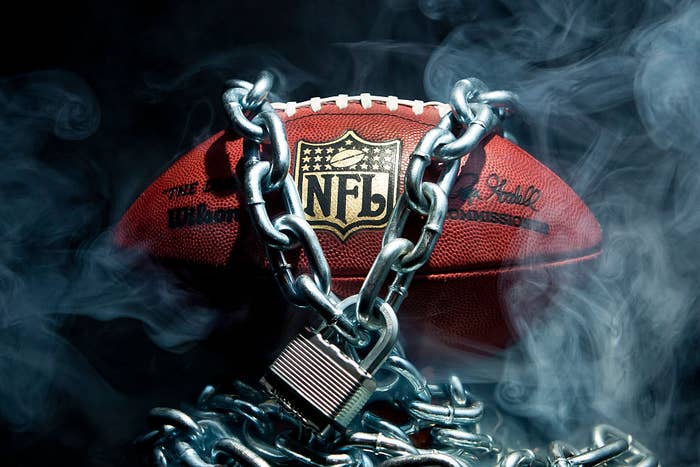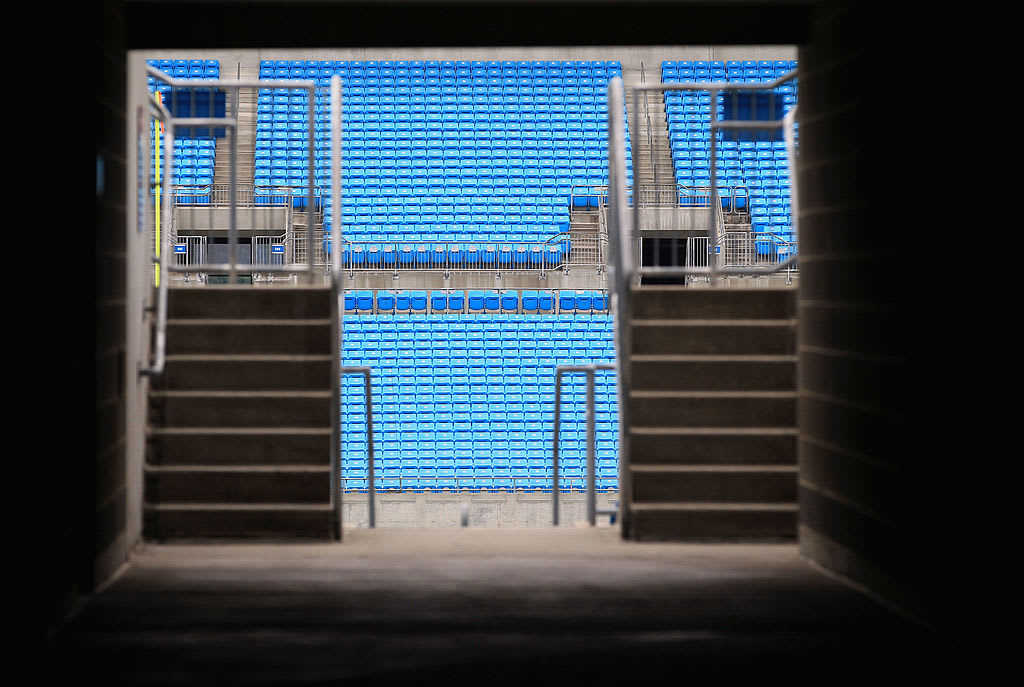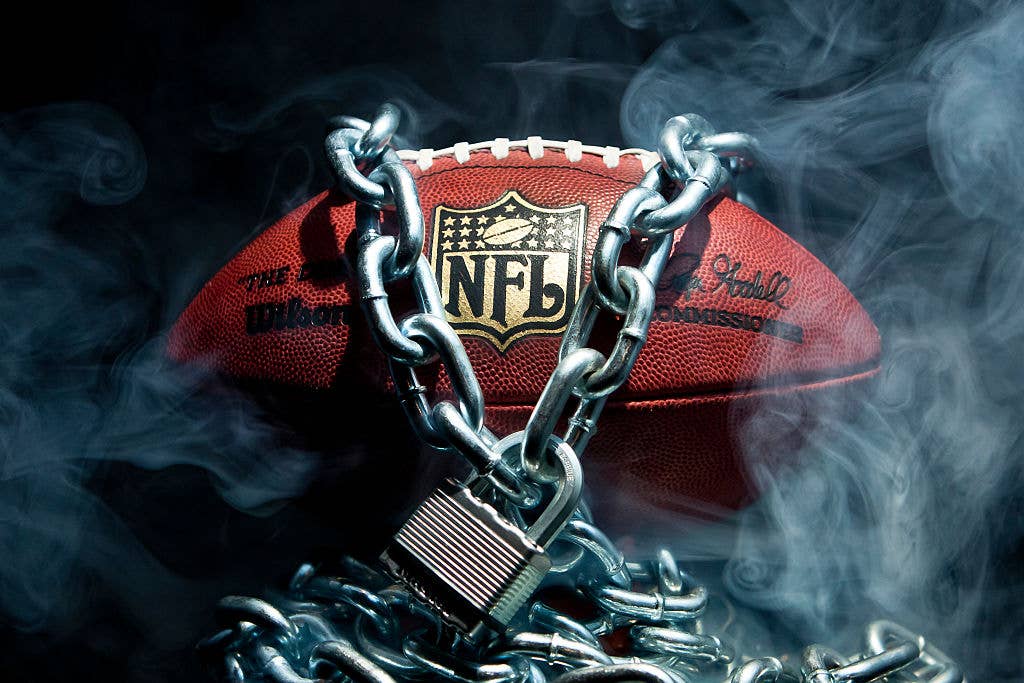
The second Sunday of September is like a New Year’s Day of sorts for millions of Americans—it typically marks Week 1 of the NFL season. It’s the weekend where Sunday finally becomes Sunday again. Fans set their fantasy lineups, see their favorite team in action, and spend the entire day glued to the TV. It’s a beautiful thing when football and Sunday are united in holy matrimony, the way it ought to be.
Four years from now, however, they could be in the middle of bitter divorce proceedings.
NFLPA head DeMaurice Smith said last month that a lockout or strike is a “virtual certainty” come 2021. The NFL’s current 10-year collective bargaining agreement, or CBA, will be set to expire following the 2020 season. The current CBA is generally considered to be an owner-friendly one, due to rookie salary restrictions that lead to lower pay for younger players, and limitations on renegotiating those rookie deals—despite record profits by teams.
So does that mean the season will be at risk?
Probably not, says Michael LeRoy, a University of Illinois sports and labor law professor.
“I think given their history, [a work stoppage] is a very real possibility. On the other hand, I view that particular comment as posturing,” he says. “It sort of borrows from [Donald] Trump’s methodology in negotiating, which is you start with the harsh reality to sort of frame the perspective and you try to reel it back in.”
According to LeRoy, while a lockout could happen during the off-season, it’s not likely to bleed into the regular season. There’s too much for both the owners and players to lose if games are missed.
“I think the owners in the long term have more to lose because fans are starting to get a little impatient with the NFL."
“It’s pretty easy to lock players out in March; they don't want to bang their heads in an OTA,” says LeRoy. “If the contract were to expire on August 15, that would be a real concern. If you have one in March, the season just ended, and they've [had off-season lockouts] before, so I don't think that's extremely problematic.”
This means that the league and the players, although they have four years to negotiate, will be under intense pressure to reach a deal if there is no agreement by March 2021. And with league-union relations at a tense point, there is going to be a lot of hashing out between parties.
One of the obvious contention points is going to be economic. While team values and profits have increased exponentially, salary caps have increased only incrementally—that’s sure to be a key issue for the union, which would presumably hold out for a more beneficial financial deal for the players. The players currently get about 47 percent of league revenues.
According to former NFL Counsel for Operations and Litigation Jodi Balsam, owners have a natural advantage over players in negotiation.
“Owners win any power struggle,” says Balsam. “Players have short careers, they have no guaranteed money, no guaranteed contract, and there's a growing class divide between veterans who earn big, while the rest of the labor pool is young, cheap, and disposable.”
The owners’ upper hand, however, may be diminished this time around—thanks to the concussion controversy surrounding the league. More attention has been placed on player safety today than it ever has. And while this will undoubtedly be an issue of its own come 2021, this could be an ancillary bargaining chip for players on other issues that the players did not have in 2011.
“I think they can get the public on their side for that,” says Balsam of players asking for increased compensation stemming from concussion concerns. “I think a lot of the posturing about health and safety about the side of the players is window dressing. I think it's going to be: How does the money get split, how does the deal get structured, how is the rookie wage scale rolled back?”
In addition to the “window dressing” that Balsam describes, the league could also use head injuries as a method of scaling back some physical activity. The 2011 CBA barred “two-a-day” practices, so perhaps the players could look to go even further here.
“I think [concussion concerns] will show up in a union proposal to cut off all contact in practice,” LeRoy said. “I think that’ll be a point of emphasis for the union.”

The increasing focus on head injuries recently forced the NFL to concede on something that was a key issue in the 2011 lockout: an 18-game season. Commissioner Roger Goodell, who previously pushed strongly for extending the season, backed off of that request earlier this year.
Of all the contention points leading up to 2021, none has been the cause of more league-union strife than the personal conduct policy. High-profile issued suspensions of Ray Rice, Tom Brady, and Ezekiel Elliott have all led to lawsuits brought forward by the NFLPA. It has clearly been a primary concern for the union.
According to Balsam, though, this could fade into the woodwork due to the low amount of players affected by the policy.
“I think that is posturing,” says Balsam of the union’s hardline stance against the conduct policy. “And the main reason is, look at the numbers: In the last year, there have been 36 arrests that might have led to off-field misconduct discipline. Where's the constituency to prioritize this issue in negotiations?”
Another possible layer to the negotiations is the potential decline of the NFL’s popularity. The league experienced a widely publicized eight percent dropoff in viewership last season. Whether this indicates a one-year fluke or a more permanent problem remains to be seen. But if it’s the latter, expect both sides to move quickly to avoid the bad publicity of a strike.
“If both the NFL and NFLPA see the brand as at harm or at risk, that could be a scenario where they seek to avoid a work stoppage and try to put a more harmonious agreement together,” says LeRoy.
Missed games could exacerbate football’s decline. It’s worth noting that baseball’s popularity decline—especially in younger demographics—accelerated after the 1994 players’ strike forced that year’s World Series to be cancelled. It may not have been the root cause of that decline, but it definitely didn’t help.
“I think the owners in the long term have more to lose because fans are starting to get a little impatient with the NFL,” Balsam, the former league attorney says. “I think the concussion crisis made fans look at the sport differently. I think it would be dangerous [for the NFL] to give fans a chance to see what life is like without football.”
So will we see what life is like without football in 2021? Most indicators say that while a lockout is possible, a deal will be reached before games are actually impacted.
Still though: The prospect of a labor stoppage in 2021 is very real. And this story is only going to get bigger as time goes on.

